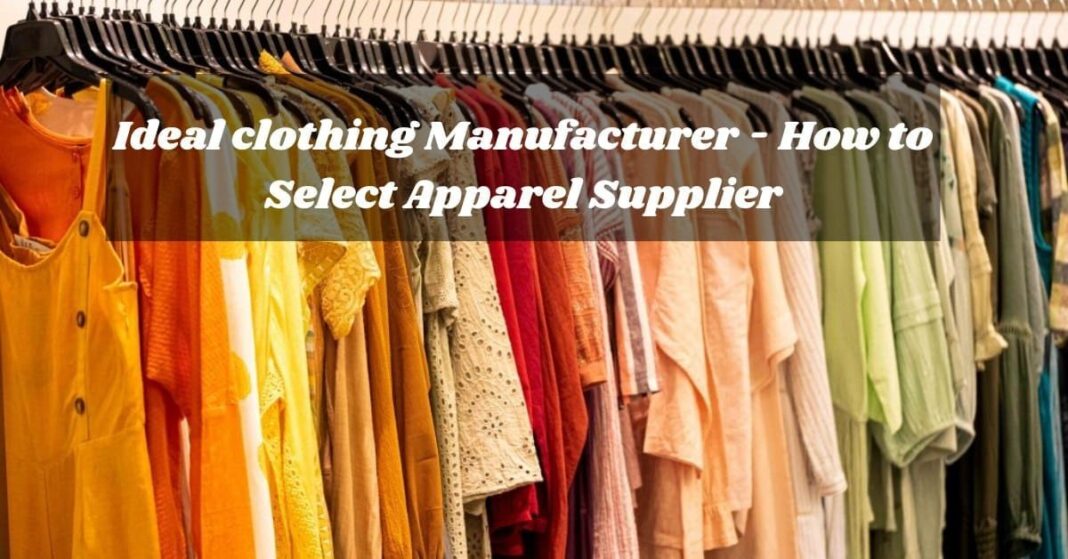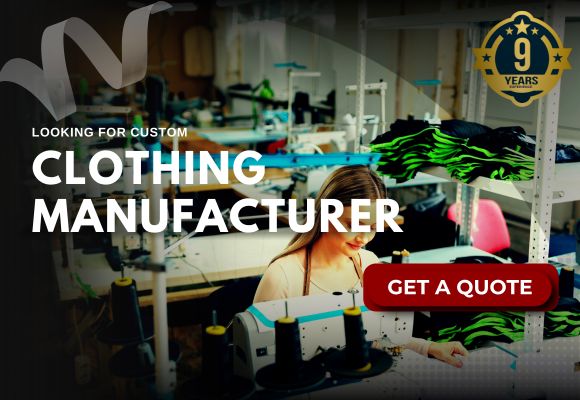Finding the right Ideal Clothing Manufacturer can make or break a fashion business. Whether you are a startup designer, about to release your first line, or a more established brand looking to ramp up production, choosing the right supplier of clothing can be the difference between churning out high-quality, cost-effective garments on time, or finding yourself drowning in a sea of costly delays and subpar products.
After 20 years of experience in working with apparel suppliers and manufacturers, I can attest that this is the most important decision you will make. This guide will help you identify critical criteria in choosing the right Apparel suppliers for your brand – and what to avoid in the process.
Table of contents
- Understanding the Role of a Clothing Manufacturer
- Why Choosing the Right Apparel Suppliers Matters
- Key Factors to Consider When Selecting a Clothing Manufacturer
- Domestic vs. Overseas Apparel Suppliers
- How to Build a Strong Relationship with Your Clothing Manufacturer
- Red Flags to Watch Out For in a Clothing Manufacturer
- Conclusion
- FAQs
Understanding the Role of a Clothing Manufacturer
To select Ideal clothing manufacturer turns your designs into a reality. They source fabric, cut, sew and finish the garments and, sometimes, they’ll do more boutique work such as embroidery or print. They will also help you scale your business, often taking on bulk production runs. The one decision you’ll make in the fashion production process that can have the biggest effect is who your manufacturer is.
Why Choosing the Right Apparel Suppliers Matters
The supplier you choose will ultimately shape not only the quality of your product but also your margins, the reliability of delivery, and your ability to meet demand. A good supplier can guarantee predictable quality at a reasonable price, make production as smooth as possible, and all of this can sustain your brand in turn. A poor supplier can result in a delayed shipment, a subpar product, and a tainted relationship.
Key Factors to Consider When Selecting a Clothing Manufacturer
Define Your Product Needs and Specifications
You should decide what you need before approaching potential suppliers. What kind of clothing are you crafting? Haute couture? Casual wear? Sportswear? What fabrics do you need? What kind of finishes? Once you know what your product requirements are, you can narrow your search to manufacturers that can meet those requirements.
Look for Experience in Your Product Type
Not every manufacturer produces every possible type of clothing. Some make luxury garments, some make mass-market apparel, and so on. Be sure that the manufacturer you choose has experience producing the type of clothing you want to produce. Their experience will be evident in the quality of the finished goods and how well they can handle production.
Check for Manufacturer Reputation and Reviews
Reputation is paramount. Do your homework. Check online to see if you can approche an ideal clothing manufacturer who has a solid history. Look for reviews, testimonials and case studies about its past work. Ask other brands who have worked with the manufacturer if they would be willing to give an honest referral.
Understand Minimum Order Quantities (MOQs)
Minimum order quantity (or MOQ) is a standard requirement for almost every clothing manufacturer, especially larger ones. The MOQ can be as low as a dozen pieces to a few hundred or even thousands of pieces. When you’re just starting out and launching a small to medium-sized brand, it’s best to look for manufacturers with a MOQ appropriate for your current demand without overstretching your budget.
Assess the Manufacturer’s Production Capacity
First of all, you need a clothing manufacturer that can grow with you. Make sure the company can produce at a volume that meets your current needs and will also be able to keep up with your growth as your brand scales. Don’t get stuck with a manufacturer who has a limited production capacity. They’ll only end up slowing down your production schedules and hurting your ability to fulfil orders on time to your customers.
Evaluate the Quality Control Processes
Quality: Faulty products cannot hurt your brand. Make sure the manufacturer has a robust process in place to check the quality of the garment at every step of production. Ask about their quality assurance process and whether they have a quality control department to check products.
Ensure Transparent Communication and Responsiveness
Good communication in your relationship with your apparel suppliers of products is of the utmost importance. A good garment manufacturer should be responsive, clear, and reachable. You should get frequent updates on your production status and be able to ask questions about anything that is unclear. Bad communication can lead to misunderstanding and mistakes.
Check for Certifications and Compliance
Ensure that the manufacturer is in compliance with industry standards, has appropriate certifications, such as ISO certification for quality management, and certification for the ethical and sustainable production of the goods. If the manufacturer is not in compliance with the relevant regulations, it could put your business at risk of legal action
Evaluate Ethical and Sustainable Practices
Sustainability is a growing concern as far as fashion is concerned, as more and more consumers clamour for clothing that is ethically made with minimal impact on the environment. If this is something your brand cares about, make sure your manufacturer abides by the same principles, whether that’s through using biodegradable fabrics, minimizing wastage, or paying their workers a fair wage and maintaining good working conditions.
Understand Lead Times and Delivery Schedules
Manufacturing lead times can be quite long, depending on the complexity of your garments and the schedule of your manufacturer. Ask for realistic timelines from the manufacturer and add a buffer for quality control and shipping. When your garments arrive on time, your sales schedules will be met, and your customers will be happy.
Compare Pricing but Don’t Compromise on Quality
Price is of course a factor, but it is not the only – or necessarily the most important – consideration. It’s tempting to go with the manufacturer who offers the lowest price, but this could mean an inferior product. A lower price could mean that the manufacturer cuts corners in terms of fabric quality, labour or production standards. Better to spend a little more on an impeccable manufacturer who will deliver quality every time.
Domestic vs. Overseas Apparel Suppliers
When Select Ideal clothing manufacturer, you need to make a decision whether it should be a manufacturer in your country or a manufacturer overseas. Each approach has it advantages and disadvantages. Read More MMA manufacturer.
Advantages of Domestic Clothing Manufacturers
- Faster Shipping Times: Domestic manufacturers can offer quicker delivery, reducing your overall lead times.
- Higher Quality Control Higher quality control is generally observed by domestic manufacturers
- Ease of communication: When you’re working with a manufacturer in your home country, language and time zones should not pose a problem.
Challenges of Domestic Apparel Suppliers
- Greater Costs: Even if your offshore suppliers might save you money in the short term, there will be higher labour and production costs with domestic manufacturing, which could cut into your profit margins.
- Fewer fabric choices: Even if you can find materials you like, the selection will be smaller than what you can get overseas.
Benefits of Overseas Manufacturers
- Lower Prices: Manufacturers abroad can sell products at a much lower price because of the lower cost of labour.China, Bangladesh and Vietnam are among the countries with the lowest manufacturing costs in the world.
- Materials Versatility: China, for one, has access to an array of materials that you can play with in your designs.
Risks of Overseas Manufacturing
- Lead Times: It may take longer to ship from overseas and you might encounter delays due to customs or some other logistics issue.
- Communication problemsLack of common language and cultural differences may lead to misunderstandings, and work schedules in different countries may also hinder communication due to time zone differences.
- Quality Control: The further away the factory is from your home base, the more difficult it will be to quality check the factory. This difficulty increases proportionally the further you travel.
How to Build a Strong Relationship with Your Clothing Manufacturer
You need to foster a relationship with your ideal clothing manufacturer that will hopefully be long-term. Communicate clearly, respect their processes, and have a cooperative attitude. Give them feedback and be open to their suggestions. The more you include them in your project, the more they will feel a sense of ownership, which can really help.
Red Flags to Watch Out For in a Clothing Manufacturer
- Unrealistic Promises: If a manufacturer promises prices far lower than his or her competitors, or fast shipping times that seem too good to be true, they probably are. Such manufacturers can cut corners or produce poor-quality products.
- If that manufacturer is hard to reach or slow to respond, it’s a sign that poor communication could be a persistent problem.
- Secrecy: If a manufacturer won’t share their processes, pricing or past clients with you, they might have something to hide. Transparency is essential in any business relationship.
Conclusion
Finding the ideal clothing manufacturer for your brand is not something that can be done overnight. You will need to invest time and effort into researching your options, and you will need to make decisions that will shape your business for years to come. If you choose a local manufacturer, you’ll have to ensure a good match with your product needs and also evaluate their quality control and ethics. Similarly, if you choose a manufacturing partner overseas, you will also need to evaluate this company to make sure they can meet your needs in terms of product quality, delivery times and ethical practices. In the end, the right supplier of apparel will help you create great products that resonate with your clients, while ensuring the success and growth of your business. Read more Types of best Jogger For Women.
FAQs
MOQs vary by manufacturer and product type, but they can range from as low as 50 units to as high as 10,000 units or more. Small brands should look for manufacturers with lower MOQs.
Choose a manufacturer with a robust quality control process in place. Regularly review samples, visit the factory if possible, and maintain clear communication with the manufacturer.
Production lead times can range from 4 to 12 weeks, depending on the complexity of the garments and the manufacturer’s workload. Always ask for an estimated timeline before starting production.


